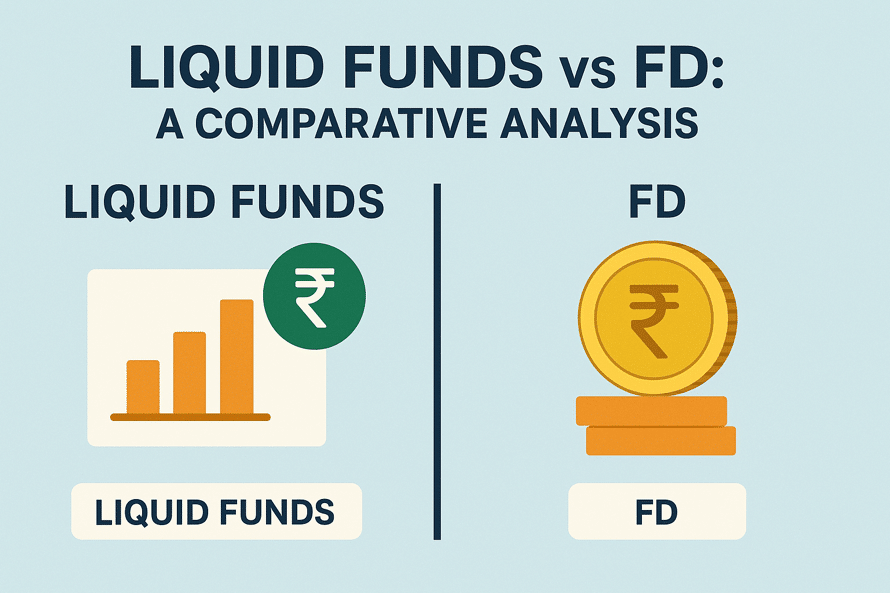Liquid Funds vs. FD: A comparative analysis

When investing money, most people choose between liquid funds and fixed deposits (FDs). Both are low-risk investment options and have a broad appeal to conservative investors. However, depending on your goals, whether you need flexibility and how fast you need money, you must choose the right financial product.
Liquid funds often receive investor attention for providing superior returns with immense safety. On the other hand, FDs are trusted for their fixed rate of interest and assured returns. Are you wondering if a liquid fund is better than FD? This blog post will help you understand both products. Though they appear similar, each one has its own features and advantages.
Liquid funds vs. FD: Understanding the meaning
Liquid funds are debt funds that invest in short-term, assured interest-bearing money market instruments, such as Treasury bills, commercial papers, and high-rated corporate and government bonds. These instruments have a maturity period of ninety-one days.
- The primary goal of the liquid funds is the provision of security in terms of capital conservation. Because of this, these funds invest in high-rated money market instruments. Thus, liquid funds are believed to be less risky compared to any other category of mutual funds.
- The most common type of bank deposit is the fixed deposit. Under this, users deposit a lump sum within a given period of time to get much higher interest than what regular savings accounts offer. Fixed deposits are offered by most banks and financial institutions.
An individual may choose to get the interest on a periodic basis, where one will receive the interest that accumulates at the end of the tenure of the fixed deposit. Investors can decide to invest in fixed deposits depending on their willingness to accept a fixed rate of return. But when the question is, “Is liquid fund better than FD?” you have to analyze both products before investing.
Comparison between fixed deposits and liquid funds
Understanding the differences between the two before making an investment decision is important. The major differences include features, benefits, limitations, and market risks. The knowledge of such differences can guide investors in informed investment decisions.
As of October 2023, the total assets under management (AUM) of debt mutual funds in India are estimated at $171.9 million. Of these, about 53.7 million dollars in assets were invested in liquid funds, while 18 million dollars was invested in money market funds.
FD vs. Liquid Funds: A comparative analysis
Both investments are excellent for different needs. Therefore, if one is asking, is a liquid fund better than FD, then one needs to understand the basic differences.
• Investment Advantages
Liquid funds are good in offering better returns to investors than savings and current accounts. They are not volatile because they invest in high-credit-rating instruments. Liquid funds are generally free from exit loads (conditions apply), and these funds mature in 91 days. Such funds are of a liquid type and can be redeemed in a single day. Interest rates do not influence them.
Conversely, fixed deposits are presumed to be the safest investment compared with other kinds of savings investments. The rate of interest on the fixed deposit account is also constant despite the variation in the market for the tenure of the deposit. On maturity of a fixed deposit account, the customer can either instruct the bank to credit the amount or reinvest the same for another fixed period. FDs enjoy a fixed rate of interest. There are several banks that provide FDs for tenures ranging from 7 days to 10 years.
• Investment Returns
Fixed deposits come with fixed interest rates. The interest rates on fixed deposits are influenced by several factors such as monetary policy and the state of the economy.
Fixed deposit returns are much higher than those in a savings account and relatively lower than those of a liquid fund. Unlike fixed deposits, there is no fixed rate of interest in liquid funds. But they generally provide slightly higher returns in comparison to FD. Here, the fund managers do not venture into high risks and work to offer consistent returns.
• Maturity Time
Fixed deposits have their stated maturity period. The interest rate paid on the invested amount is based on the time frame of the deposit. However, you can withdraw your money before maturity, but you have to pay a penalty, and the penalty amounts to about 1% of the relevant interest. At the same time, liquid funds can be withdrawn at any time with no payment of penalty or charges.
You should remember that you are charged an exit load on your liquid funds if you sell your units within 7 days after purchase. For instance, if you purchase a liquid fund and redeem the units after 2 days. You will then be subjected to the exit load. There will be no charges on the exit of liquid funds after the 7th day. Therefore, they provide better liquidity than FD. If you want to know whether a liquid fund is better than FD, then this aspect should be considered before investing.
• Liquidity
Chances are high that the bank fixed deposit proceeds will be credited to your bank account on the same day if you have a savings or current account with the same bank. However, a bank can impose a fine in the event of premature withdrawal.
As of today, all liquid funds can be redeemed with no exit load/penalty. In case the redemption request is made before 3:00 PM, money is normally credited to the unitholder’s bank account before 12 noon the following working day.
• Taxation
Liquid funds are less taxed than FDs, particularly for taxpayers who belong to high tax brackets. As an add-on, the indexation benefit may also be applicable to long-term Liquid Fund investments, thereby enhancing further tax savings.
Interest generated on all fixed deposits is taxable as per the income-tax slab rate (10, 20 or 30%) of the investor. Tax is deducted at source. Interest up to Rs. 50000/- per annum is exempted from taxation for investors aged 60 years and above.
How do you choose between liquid funds and FD?
Do you want to know if a liquid fund is better than FD? Analyze these criteria before investing. The decision between Liquid Funds or FDs depends on your financial goals, investment horizon, and appetite for risk. Below is a brief guide that should help you make a decision.
• Who should consider investing in a fixed deposit?
A person wanting to save money but not exposed to market risk can choose a fixed deposit investment. A user who is a housekeeper and has a decent salary may invest in FDs. If you have taxable income, FD can be a tax-saving investment instrument.
This investment can be chosen by a retired person who needs a constant source of income. If you have specific short-term financial goals, like buying a car or financing a wedding, FDs can assist with saving and earning returns in the long run.
• Who should invest in liquid funds?
Liquid funds are suitable for investors with surplus cash to invest for a short period and investors who want to invest in short-term investment instruments. Any person who wishes to invest an amount as an emergency fund can go for liquid funds.
For those with surplus cash that they do not require immediately, they can consider liquid funds. These funds represent an opportunity to store excess cash at a slightly higher rate as compared to the traditional method of investment. Liquid funds can support those investors who try to transform from conservative to growth-oriented investments, including equity funds.
Conclusion
Liquid funds and fixed deposits are great investment alternatives that do not involve much risk. If you want to make a long-term investment, you must choose fixed deposits. However, if you are looking for short-term, stability kind of investments, go for liquid funds.
Investors need to evaluate their investment horizon before deciding to invest in any of these products and answer the question: Is liquid fund better than FD?. It is a matter of choice, but for the short-term objectives and ease of use, liquid funds can be a wiser alternative.
FAQs
Q. Which is better, a liquid fund or a fixed deposit?
Both FDs and liquid funds provide many advantages, but they focus on different financial needs. FDs are good if you seek assured returns and safe, long-term choices. On the other hand, there is flexibility and faster access to funds in liquid funds.
Q. What are the disadvantages of liquid funds?
Liquid funds are usually regarded as safe. However, they do have certain drawbacks. Some of these are comparatively low returns against other investment opportunities, vulnerability to market risk, and returns from investments are not guaranteed as in a fixed deposit.
Q. Is a liquid fund tax-free?
Capital gains tax applies to the sale of liquid fund units. Short-term capital gains tax apply to units of liquid funds sold or redeemed within three years, while for units held for more than three years, LTCG at the rate of 12.5% applies.
Q. Which is better, a liquid fund or an RD?
Liquid funds are seen as a better alternative to recurring deposits (RDs) for short-term savings and emergencies. Liquid funds generally provide a better rate of return than RDs while retaining a high degree of liquidity.
Disclaimer
The stocks mentioned in this article are not recommendations. Please conduct your own research and due diligence before investing. Investment in securities market are subject to market risks, read all the related documents carefully before investing. Please read the Risk Disclosure documents carefully before investing in Equity Shares, Derivatives, Mutual fund, and/or other instruments traded on the Stock Exchanges. As investments are subject to market risks and price fluctuation risk, there is no assurance or guarantee that the investment objectives shall be achieved. Lemonn (Formerly known as NU Investors Technologies Pvt. Ltd) do not guarantee any assured returns on any investments. Past performance of securities/instruments is not indicative of their future performance.







